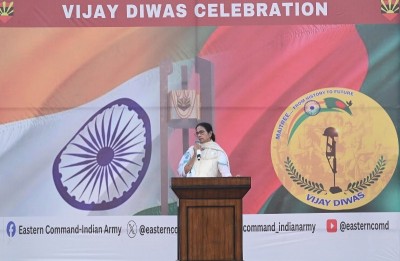 Nanotechnology
Nanotechnology
Jammu and Kashmir: Training on role of nanotechnology in agriculture commences at SKUAST-K
Srinagar: With an aim to enhance higher-order professional skills of the students, a 10-day training programme on ‘Role of Nanotechnology in Modern Agriculture’ commenced Monday at Sher-e-Kashmir University of Agricultural Sciences and Technology, Kashmir.
The training has been organised by the university’s Division of Plant Pathology, Faculty of Horticulture under the World Bank-ICAR funded National Agricultural Higher Education Project (NAHEP) for the institutional development of SKUAST-K. About 250 students and scholars from 23 agricultural universities and other institutions from across the country are participating in the training.
Participants were chosen from 600 applicants. More than 20 nanotechnology experts including five renowned international academicians will be delivering the lecturers and conducting the training covering a wide range of topics in the broader realm of nanotechnology.
Director Education and Dean Faculty of Fisheries, Prof MH Balkhi, who was the chief guest at the inaugural function, while lauding the organizers for conducting the training on nanotechnology which is most relevant in the present times, said it should be used for the benefit of humanity.
He said nanotechnology should help the farmers in reducing the use of problematic pesticides as rampant use of chemical pesticides has harmed human health and imbalanced the ecology.
Therefore, the focus should be on efficient nano-pesticides, which are safe for human life and the environment, he added. Director Planning and Principal Investigator IDP-NAHEP for SKUAST-K, Prof Nazir Ahmad Ganai said such skill trainings are important for shaping the students of the university for the future.
He said the earlier thrust of the students was on the public sector employment but those jobs have squeezed now. Presently, it is all knowledge-based economy and students have to compete in the private sector which is driven by the 4th generation industrial revolution, he said.
“To compete in the knowledge economy, students need to have higher-order professional skills in nanotechnology, automation, artificial intelligence, block chain etc.,” Ganai said, adding, “Agriculture is a thriving sector with a lot of innovation opportunities from the farm up to when the food reaches a mouth and nanotechnology has an important role to play in it all.”
Head Division of Plant Pathology, Prof Nisar Ahmad Khan talked in detail about the role of nanotechnology in modern agriculture. Prof Tariq Ahmad Shah in his welcome address provided a detailed overview of the 10-day programme.
Dr Tariq A Sofi presented the vote of thanks. Dr MD Shah, DrMushtaq A Bhat, DrAfaq Hamid of Plant Pathology and DrShabir Ahmad Bangroo of Soil Sciences, besides a number of faculty members and students, participated in the inaugural function.
Support Our Journalism
We cannot do without you.. your contribution supports unbiased journalism
IBNS is not driven by any ism- not wokeism, not racism, not skewed secularism, not hyper right-wing or left liberal ideals, nor by any hardline religious beliefs or hyper nationalism. We want to serve you good old objective news, as they are. We do not judge or preach. We let people decide for themselves. We only try to present factual and well-sourced news.







